Inaugural Address肯尼迪就职演说修辞总结
- 格式:doc
- 大小:20.00 KB
- 文档页数:3
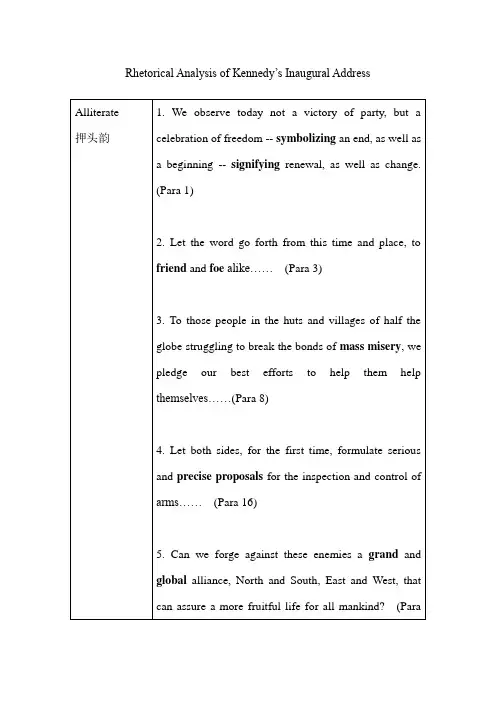

肯尼迪《就职演说》中的语域分析摘要:肯尼迪一九六一年的就职演说被称作是二十世纪最令人难忘的两次美国总统就职演说之一,引起了国际上的广泛关注。
然而当前对政论性演说的研究主要集中于文体学、修辞学领域,从系统功能语言学角度进行的研究显得相对匮乏。
本文从语场、语旨、语式三个方面分析了被奉为政治演说词经典的肯尼迪《就职演说》中的语域,进而发掘了该演说词的语言特征,加深了对演说者演说意图的理解。
文章不仅丰富了政治演说词已经取得的研究成果,而且验证了语域理论用于政治演说词分析的有效性。
关键词:就职演说;语域特征;语域分析一.引言历届美国总统的就职演说的特点较其他形式的公开演说更为突出,表现在其时间的固定性(一月二十日)、地点的固定性(白宫)、演说者身份的固定性(当选为美国总统的人)、听众的固定性(美国民众和世界各国)、内容的相似性(施政纲领、国内国际形势等)。
此类演说均是历任总统先生经过深思熟虑、字斟句酌的成果,因此往往成为学者和研究者们科学研究的语料。
美国第35届总统约翰••菲茨杰拉德•肯尼迪于1961年1月20日发表的就职演说无论是在内容上还是形式上,均堪称政论性演说中的经典。
对该就职演说的研究集中于文体学和修辞学领域,鲜有从语域角度进行的分析。
本文将语域理论运用于对肯尼迪就职演说词的分析,从一个全新的角度探索政治演说词的特点,一方面可以丰富政治演说词已有的研究成果,另一方面可以验证语域理论用于演说词分析的有效性。
二.文献回顾语域是语言学中的一个重要概念,它初是Reid在1956年研究双语现象时提出来的。
英国籍波兰人类学家马林诺夫斯基(Malinowski)把语境分为三类:话语语境(context of utterance)、文化语境(context of culture)和情景语境(context of situation)。
此后韩礼德等人将文化语境与情景语境的概念与语言系统相结合,并在其著作中进行阐释从而形成了语域理论。
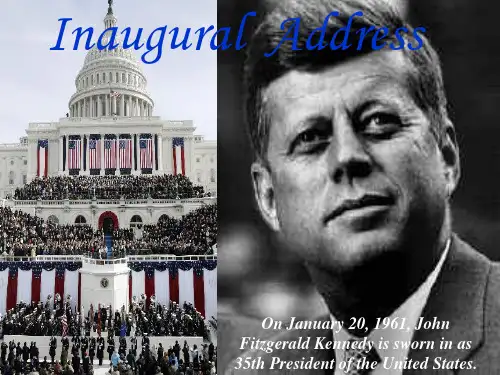
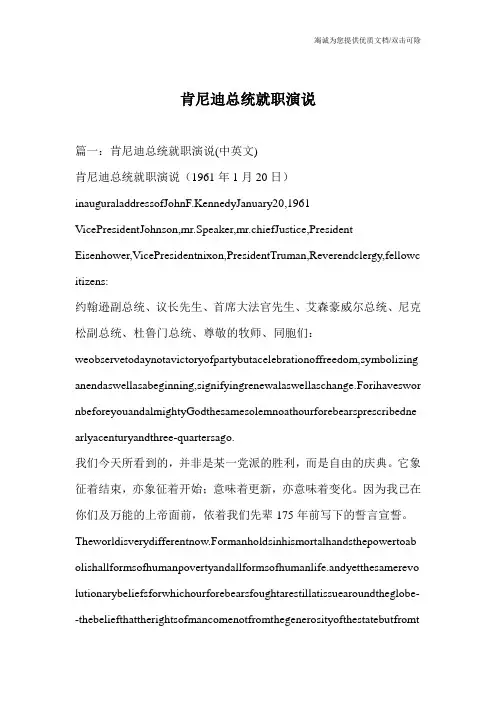
肯尼迪总统就职演说篇一:肯尼迪总统就职演说(中英文)肯尼迪总统就职演说(1961年1月20日)inauguraladdressofJohnF.KennedyJanuary20,1961 VicePresidentJohnson,mr.Speaker,mr.chiefJustice,President Eisenhower,VicePresidentnixon,PresidentTruman,Reverendclergy,fellowc itizens:约翰逊副总统、议长先生、首席大法官先生、艾森豪威尔总统、尼克松副总统、杜鲁门总统、尊敬的牧师、同胞们:weobservetodaynotavictoryofpartybutacelebrationoffreedom,symbolizing anendaswellasabeginning,signifyingrenewalaswellaschange.Forihaveswor nbeforeyouandalmightyGodthesamesolemnoathourforebearsprescribedne arlyacenturyandthree-quartersago.我们今天所看到的,并非是某一党派的胜利,而是自由的庆典。
它象征着结束,亦象征着开始;意味着更新,亦意味着变化。
因为我已在你们及万能的上帝面前,依着我们先辈175年前写下的誓言宣誓。
Theworldisverydifferentnow.Formanholdsinhismortalhandsthepowertoab olishallformsofhumanpovertyandallformsofhumanlife.andyetthesamerevo lutionarybeliefsforwhichourforebearsfoughtarestillatissuearoundtheglobe--thebeliefthattherightsofmancomenotfromthegenerosityofthestatebutfromthehandofGod.世界已然今非昔比,因为人类手中已经掌握了巨大的力量,既可以用来消除各种形式的贫困,亦可用以毁灭人类社会。
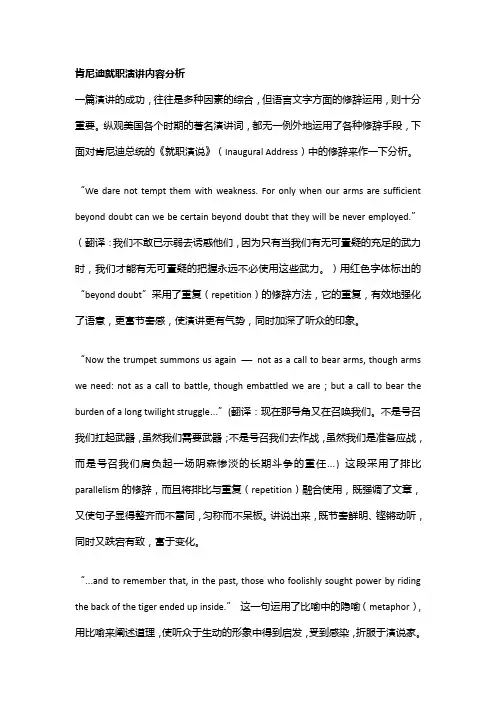
肯尼迪就职演讲内容分析一篇演讲的成功,往往是多种因素的综合,但语言文字方面的修辞运用,则十分重要。
纵观美国各个时期的著名演讲词,都无一例外地运用了各种修辞手段,下面对肯尼迪总统的《就职演说》(Inaugural Address)中的修辞来作一下分析。
“We dare not tempt them with weakness. For only when our arms are sufficient beyond doubt can we be certain beyond doubt that they will be never employed.”(翻译:我们不敢已示弱去诱惑他们,因为只有当我们有无可置疑的充足的武力时,我们才能有无可置疑的把握永远不必使用这些武力。
)用红色字体标出的“beyond doubt”采用了重复(repetition)的修辞方法,它的重复,有效地强化了语意,更富节奏感,使演讲更有气势,同时加深了听众的印象。
“Now the trumpet summons us again —not as a call to bear arms, though arms we need: not as a call to battle, though embattled we are;but a call to bear the burden of a long twilight struggle…”(翻译:现在那号角又在召唤我们。
不是号召我们扛起武器,虽然我们需要武器;不是号召我们去作战,虽然我们是准备应战,而是号召我们肩负起一场阴森惨淡的长期斗争的重任…) 这段采用了排比parallelism的修辞,而且将排比与重复(repetition)融合使用,既强调了文章,又使句子显得整齐而不雷同,匀称而不呆板。
讲说出来,既节奏鲜明、铿锵动听,同时又跌宕有致,富于变化。
“…and to remember that, in the past, those who foolishly sought power by riding the back of the tiger ended up inside.”这一句运用了比喻中的隐喻(metaphor), 用比喻来阐述道理,使听众于生动的形象中得到启发,受到感染,折服于演说家。
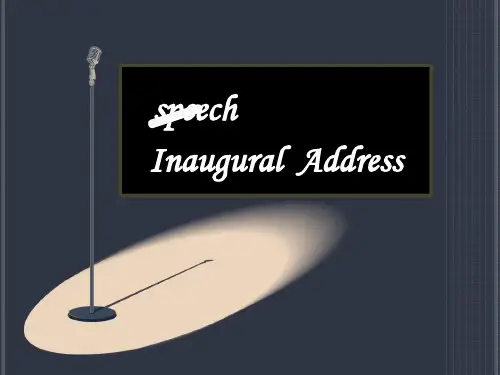
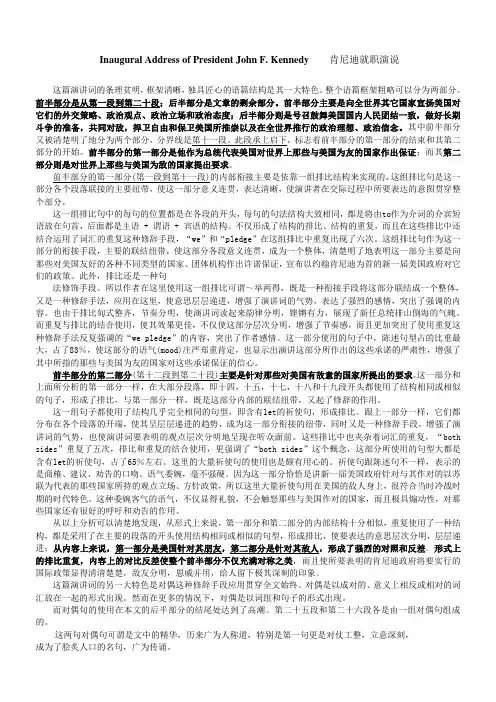
这篇演讲词的条理贫明,框架清晰,独具匠心的语篇结构是其一大特色。
整个语篇框架粗略可以分为两部分。
前半部分是从第一段到第二十段;后半部分是文章的剩余部分。
前半部分主要是向全世界其它国家宣扬美国对它们的外交策略、政治观点、政治立场和政治态度;后半部分则是号召鼓舞美国国内人民团结一致,做好长期斗争的准备,共同对敌,捍卫自由和保卫美国所推崇以及在全世界推行的政治理想、政治信念。
其中前半部分又被清楚明了地分为两个部分,分界线是第十一段。
此段承上启下,标志着前半部分的第一部分的结束和其第二部分的开始。
前半部分的第一部分是他作为总统代表美国对世界上那些与美国为友的国家作出保证;而其第二部分则是对世界上那些与美国为敌的国家提出要求。
前半部分的第一部分(第一段到第十一段)的内部衔接主要是依靠一组排比结构来实现的。
这组排比句是这一部分各个段落联接的主要纽带,使这一部分意义连贯,表达清晰,使演讲者在交际过程中所要表达的意图贯穿整个部分。
这一组排比句中的每句的位置都是在各段的开头,每句的句法结构大致相同,都是将由to作为介词的介宾短语放在句首,后面都是主语 + 谓语 + 宾语的结构。
不仅形成了结构的排比、结构的重复,而且在这些排比中还结合运用了词汇的重复这种修辞手段,“we”和“pledge”在这组排比中重复出现了六次。
这组排比句作为这一部分的衔接手段,主要的联结纽带,使这部分各段意义连贯,成为一个整体,清楚明了地表明这一部分主要是向那些对美国友好的各种不同类型的国家、团体机构作出许诺保证,宣布以约翰肯尼迪为首的新一届美国政府对它们的政策。
此外,排比还是一种句法修饰手段。
所以作者在这里使用这一组排比可谓~举两得,既是一种衔接手段将这部分联结成一个整体,又是一种修辞手法,应用在这里,使意思层层递进,增强了演讲词的气势,表达了强烈的感情,突出了强调的内容。
也由于排比甸式整齐,节奏分明,使演讲词读起来韵律分明,铿锵有力,展现了新任总统排山倒海的气魄。
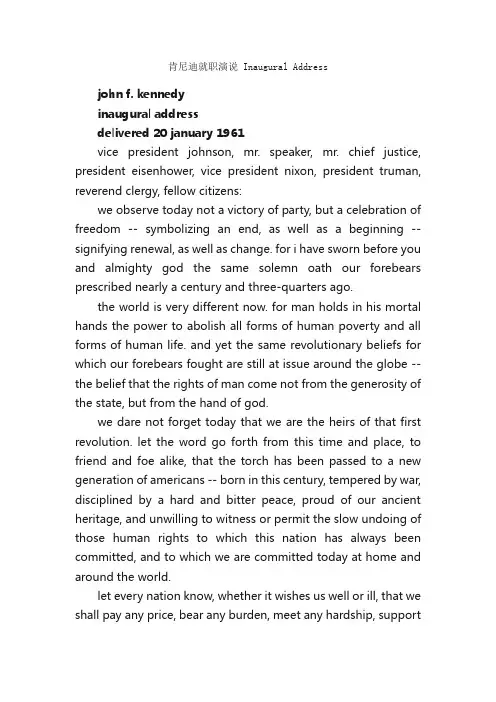
肯尼迪就职演说 Inaugural Addressjohn f. kennedyinaugural addressdelivered 20 january 1961vice president johnson, mr. speaker, mr. chief justice, president eisenhower, vice president nixon, president truman, reverend clergy, fellow citizens:we observe today not a victory of party, but a celebration of freedom -- symbolizing an end, as well as a beginning -- signifying renewal, as well as change. for i have sworn before you and almighty god the same solemn oath our forebears prescribed nearly a century and three-quarters ago.the world is very different now. for man holds in his mortal hands the power to abolish all forms of human poverty and all forms of human life. and yet the same revolutionary beliefs for which our forebears fought are still at issue around the globe -- the belief that the rights of man come not from the generosity of the state, but from the hand of god.we dare not forget today that we are the heirs of that first revolution. let the word go forth from this time and place, to friend and foe alike, that the torch has been passed to a new generation of americans -- born in this century, tempered by war, disciplined by a hard and bitter peace, proud of our ancient heritage, and unwilling to witness or permit the slow undoing of those human rights to which this nation has always been committed, and to which we are committed today at home and around the world.let every nation know, whether it wishes us well or ill, that we shall pay any price, bear any burden, meet any hardship, supportany friend, oppose any foe, to assure the survival and the success of liberty.this much we pledge -- and more.to those old allies whose cultural and spiritual origins we share, we pledge the loyalty of faithful friends. united there is little we cannot do in a host of cooperative ventures. divided there is little we can do -- for we dare not meet a powerful challenge at odds and split asunder.to those new states whom we welcome to the ranks of the free, we pledge our word that one form of colonial control shall not have passed away merely to be replaced by a far more iron tyranny. we shall not always expect to find them supporting our view. but we shall always hope to find them strongly supporting their own freedom -- and to remember that, in the past, those who foolishly sought power by riding the back of the tiger ended up inside.to those people in the huts and villages of half the globe struggling to break the bonds of mass misery, we pledge our best efforts to help them help themselves, for whatever period is required -- not because the communists may be doing it, not because we seek their votes, but because it is right. if a free society cannot help the many who are poor, it cannot save the few who are rich.to our sister republics south of our border, we offer a special pledge: to convert our good words into good deeds, in a new alliance for progress, to assist free men and free governments in casting off the chains of poverty. but this peaceful revolution of hope cannot become the prey of hostile powers. let all our neighbors know that we shall join with them to oppose aggression or subversion anywhere in the americas. and let everyother power know that this hemisphere intends to remain the master of its own house.to that world assembly of sovereign states, the united nations, our last best hope in an age where the instruments of war have far outpaced the instruments of peace, we renew our pledge of support -- to prevent it from becoming merely a forum for invective, to strengthen its shield of the new and the weak, and to enlarge the area in which its writ may run.finally, to those nations who would make themselves our adversary, we offer not a pledge but a request: that both sides begin anew the quest for peace, before the dark powers of destruction unleashed by science engulf all humanity in planned or accidental self-destruction.we dare not tempt them with weakness. for only when our arms are sufficient beyond doubt can we be certain beyond doubt that they will never be employed.but neither can two great and powerful groups of nations take comfort from our present course -- both sides overburdened by the cost of modern weapons, both rightly alarmed by the steady spread of the deadly atom, yet both racing to alter that uncertain balance of terror that stays the hand of mankind's final war.so let us begin anew -- remembering on both sides that civility is not a sign of weakness, and sincerity is always subject to proof. let us never negotiate out of fear, but let us never fear to negotiate.let both sides explore what problems unite us instead of belaboring those problems which divide us.let both sides, for the first time, formulate serious and precise proposals for the inspection and control of arms, and bring theabsolute power to destroy other nations under the absolute control of all nations.let both sides seek to invoke the wonders of science instead of its terrors. together let us explore the stars, conquer the deserts, eradicate disease, tap the ocean depths, and encourage the arts and commerce.let both sides unite to heed, in all corners of the earth, the command of isaiah -- to "undo the heavy burdens, and [to] let the oppressed go free."¹and, if a beachhead of cooperation may push back the jungle of suspicion, let both sides join in creating a new endeavor -- not a new balance of power, but a new world of law -- where the strong are just, and the weak secure, and the peace preserved.all this will not be finished in the first one hundred days. nor will it be finished in the first one thousand days; nor in the life of this administration; nor even perhaps in our lifetime on this planet. but let us begin.in your hands, my fellow citizens, more than mine, will rest the final success or failure of our course. since this country was founded, each generation of americans has been summoned to give testimony to its national loyalty. the graves of young americans who answered the call to service surround the globe.now the trumpet summons us again -- not as a call to bear arms, though arms we need -- not as a call to battle, though embattled we are -- but a call to bear the burden of a long twilight struggle, year in and year out, "rejoicing in hope; patient in tribulation,"² a struggle against the common enemies of man: tyranny, poverty, disease, and war itself.can we forge against these enemies a grand and global alliance, north and south, east and west, that can assure a morefruitful life for all mankind? will you join in that historic effort?in the long history of the world, only a few generations have been granted the role of defending freedom in its hour of maximum danger. i do not shrink from this responsibility -- i welcome it. i do not believe that any of us would exchange places with any other people or any other generation. the energy, the faith, the devotion which we bring to this endeavor will light our country and all who serve it. and the glow from that fire can truly light the world.and so, my fellow americans, ask not what your country can do for you; ask what you can do for your country.my fellow citizens of the world, ask not what america will do for you, but what together we can do for the freedom of man.finally, whether you are citizens of america or citizens of the world, ask of us here the same high standards of strength and sacrifice which we ask of you. with a good conscience our only sure reward, with history the final judge of our deeds, let us go forth to lead the land we love, asking his blessing and his help, but knowing that here on earth god's work must truly be our own.。
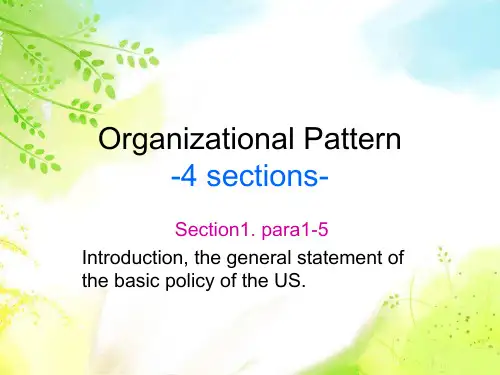
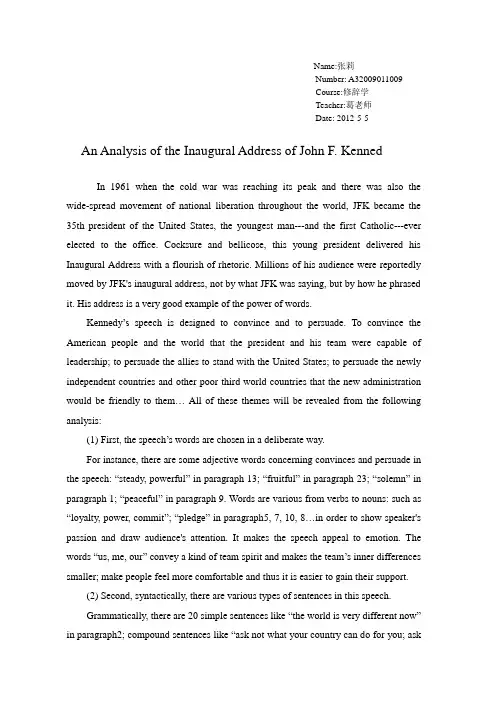
Name:张莉Number: A32009011009Course:修辞学Teacher:葛老师Date: 2012-5-5 An Analysis of the Inaugural Address of John F. KennedIn 1961 when the cold war was reaching its peak and there was also the wide-spread movement of national liberation throughout the world, JFK became the 35th president of the United States, the youngest man---and the first Catholic---ever elected to the office. Cocksure and bellicose, this young president delivered his Inaugural Address with a flourish of rhetoric. Millions of his audience were reportedly moved by JFK's inaugural address, not by what JFK was saying, but by how he phrased it. His address is a very good example of the power of words.Kennedy’s speech is designed to convince and to persuade. To convince the American people and the world that the president and his team were capable of leadership; to persuade the allies to stand with the United States; to persuade the newly independent countries and other poor third world countries that the new administration would be friendly to them…All of these themes will be revealed from the following analysis:(1) First, the speech’s words are chosen in a deliberate way.For instance, there are some adjective words concerning convinces and persuade in the speech: “steady, powerful”in paragraph 13; “fruitful”in paragraph 23; “solemn”in paragraph 1; “peaceful” in paragraph 9. Words are various from verbs to nouns: such as “loyalty, power, commit”; “pledge”in paragraph5, 7, 10, 8…in order to show speaker's passion and draw audience's attention. It makes the speech appeal to emotion. The words “us, me, our” convey a kind of team spirit and makes the team’s inner differences smaller; make people feel more comfortable and thus it is easier to gain their support.(2) Second, syntactically, there are various types of sentences in this speech.Grammatically, there are 20 simple sentences like “the world is very different now”in paragraph2; compound sentences like “ask not what your country can do for you; askwhat you can do for your country” in paragraph 25; complex sentence like “since this country was founded, each generation of Americans has been…national loyalty” in paragraph 21; compound-complex sentences like “for only when our arms are sufficient beyond doubt can we be certain beyond doubt that they will never be employed.”in paragraph 12.Functionally, apart from a lot of declarative sentences like “this much we pledge--and more” in paragraph 5, there are also 14 imperative sentences like “let both…”in paragraph 15—18, they gave rise to resonance and increased speaker's tone.Short sentences are also used to make the meaning easy to understand.With the help of different types of sentences, the whole essay was displayed in an appropriate way.(3) Third, the speech is rich in figures of speech. Both phonetic and syntactic figures of speech are adopted.Phonetically, alliteration, consonance and pun are used, which makes the speech more rhythmic, appealing and witty.Alliteration often produces some aesthetic appeal and helps readers to remember. There are more than 27 cases of alliteration in the speech:”...we shall p.ay any p.rice, b.ear any b.urden...to assure the s.urvival and the s.uccess of liberty”in paragraph 4; “...the s.ame high s.tandards of s.trength and s.acrifice...l.ead the l.and we l.ove (i)paragraph 27; “p.recise p.roposals” in paragraph 16 and so on. The use of alliterationhelps to catch audience’s attention and strengthen the expressive force.The typical example of consonance is in paragraph 4”well.or ill.”;” cultura l.andspiritual.” in paragraph 6...Pun is reflected by the word “judge”. It is a homophone. It refers to a person in thespeech, but actually, it implies the right action, which is accepted by lots of people inthe world.Syntactically, the speech’s use of repetition and parallelism helps to make thelanguage musical, emphatic, attractive and memorable.Repetition is the dominate figure in the speech. It runs through the whole speech,in paragraph 6, 7,8,10,11,17,18... “To those...”5 times;” let both...” 4 times. Through therepetition, Kennedy’s attitudes towards different countries are revealed. It is beneficial to convince and persuade those countries to stand with America. Besides, it strengthens the speech’s emotions and tone and also the artistic appeal of the language.There are more than 20 cases of parallelism in the speech: in paragraph1, 3, 4, 14, 22 and so on. Among which in paragraph15, 16, 17, 18 repetition and parallelism are used together to help audience catch his thought of speech, thus makes is easy to convey his ideas. “Let both sides explore...”and “Let both sides...”and“Let both sides seek...”and“Let both sides unite ...” which makes the speech a powerful appeal.Anaphora is used in paragraph 14:”So let us begin anew… Let us never negotiate…Let us never fear …”it is a kind of repetition of the same word at the beginning of successive clauses, sentences or verses. Anaphora and Parallelism are often used jointly to gain more emphasis to convey strong emotions. The above sentence in paragraph 14 is also a case in point. Through the adoption of the two rhetorical devices, the strong emotions of appealing is revealed.In conclusion, the above paragraphs analyze the sp eech “Inaugural Address” both lexically and syntactically. Figures of speech are also analyzed in detail with examples. Furthermore, Kennedy's inaugural address is a great classic. It’s successful.。
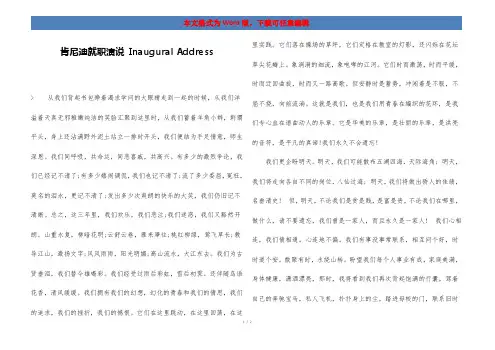
肯尼迪就职演说Inaugural Address> 从我们背起书包睁着渴求学问的大眼睛走到一起的时候,从我们洋溢着天真无邪稚嫩纯洁的笑脸汇聚到这里时,从我们蓄着羊角小辫,刺猬平头,身上还沾满野外泥土站立一排时开头,我们便结为手足情意,师生深恩。
我们同呼吸,共命运,同悲喜戚,共高兴。
有多少的激烈争论,我们已经记不清了;有多少嬉闹调侃,我们也记不清了;流了多少委屈,冤枉,莫名的泪水,更记不清了;发出多少次爽朗的快乐的大笑,我们仍旧记不清晰。
总之,这三年里,我们欢乐,我们悲泣;我们迷惑,我们又豁然开朗。
山重水复,柳暗花明;云舒云卷,雁来厣往;桃红柳绿,莺飞草长;教导江山,激扬文字;风风雨雨,阳光明媚;高山流水,大江东去。
我们为古贤垂泪,我们替今雄喝彩。
我们经受过雨后彩虹,雪后初霁。
还伴随鸟语花香,清风缓缓。
我们拥有我们的幻想,幻化的青春和我们的情思,我们的追求,我们的挫折,我们的憾恨。
它们在这里跳动,在这里回荡,在这里实践。
它们落在操场的草坪,它们定格在教室的灯影,还闪烁在花坛草尖花瓣上。
象涓涓的细流,象咆哮的江河。
它们时而激荡,时而平缓,时而迂回曲旋,时而又一路高歌。
但安静时是蓄势,冲闯着是不服,不屈不挠,向前流淌。
这就是我们,也是我们用青春在编织的花环,是我们专心血在谱曲动人的乐章。
它是华美的乐章,是壮丽的乐章,是洪亮的音符,是平凡的真谛!我们永久不会遗忘!我们更企盼明天。
明天,我们可能散布五湖四海,天际海角; 明天,我们将走向各自不同的岗位,八仙过海; 明天,我们将做出骄人的佳绩,名垂清史! 但,明天,不论我们是贫是贱,是富是贵,不论我们在哪里,做什么,请不要遗忘,我们曾是一家人,而且永久是一家人! 我们心相连,我们情相通。
心连地不偏。
我们有事没事常联系,相互问个好,时时道个安。
散聚有时,水绕山转。
盼望我们每个人事业有成,家庭美满,身体健康,潇洒漂亮,那时,我将看到我们再次背起饱满的行囊,驾着自己的奔驰宝马,私人飞机,扑扑身上的尘,踏进母校的门,联系旧时的人,重温过去的文,开启酵封的瓶,牵手往日的情,不辞万里行,查找梦中的魂。
肯尼迪就职演说分析篇一:肯尼迪就职演说评析美国第三十五任总统JohnFitzgeraldFrancisKennedy(1917-1963)约翰.弗.肯尼迪1961年元月20日在首都华盛顿国会大厦前发表“就职演说”时,我在读初中三年级,学的是俄语。
直到1980年,我才在美国出版的“EnglishForToday”“今日英语”教材的第五册里阅读到了这篇演说,而且还听了这篇演说的实况录音。
现在这篇演说已被一字未删地选入《advancedEnglish》“高级英语”(张汉熙主编,商务印书馆出版发行),《21centurycollegeEnglish》“二十一世纪大学英语”(复旦大学,交通大学主编;高等教育出版社,复旦大学出版社出版发行)英语教材里作为高等院校的英语学习教材。
1980年,那时大学外语教学还是很原始落后的。
我想得到英语版的联合国“人权宣言”,但在当时武汉的中南财经学院图书馆里没有。
找到武汉大学图书馆,那里才只有一本油印的“人权宣言”小册子。
我想得到英文版的“中华人民共和国刑法”这书,武汉的外文书店买不到。
我托原北京地院外语老师去北京外国专家局找有关专家打听此书,专家说,《刑法》英文译文由他翻译,正在他手里,由于没有出版,他不能外借。
肯尼迪“就职演说”是在演说之后十九年被我们看到。
时过境迁,20XX年元月20日,全世界几乎所有的人都能从网上及各种媒体上听到,见到,读到美国第一位黑人总统奥巴马的“就职演说”。
虽然有的人看到的是被有些媒体屏掉了(RecallthatearliergenerationsfaceddownFascismandcommunismnotjust withmissilesandtanksbutwithsturdyalliancesandenduringconvictions.我们在此回忆先辈,他们战胜了法西斯主义和共产主义,靠的不仅是导弹,坦克;更是靠坚定的盟友和不移的信念。
InauguralAddress肯尼迪就职演说修辞总结[五篇范文]第一篇:Inaugural Address肯尼迪就职演说修辞总结synecdoche / si'nekdəki /:substituting a more inclusive term for a less inclusive one or vice versaInaugural Address肯尼迪就职演说修辞总结美国总统肯尼迪的就职演说辞沿袭古希腊,罗马的修辞及文风精心选用语言句式,注意音韵效果,字字句句经过刻意雕琢。
一、Alliteration是一种常见的反复类音韵修辞格,恰当使用Alliteration能赋予语言以音韵美和节奏美,起到演染气氛烘托感情加强语言表现力等效果, 如:• Let the word go forth.....that the torch has been passed to a new generation of Americans.“(para3)• In order to assure the survival and the success of liberty …• Let both sides seek to invoke the wonders of science instead of its terrors.Together let us explore the stars, conquer the deserts, eradicate disease, tap the ocean depths, and encourage the arts and commerce.(para17)• …both rightly alarmed by the steady spread of the deadly atom(para13)二、UnderstatementUnderstatement的修辞功能在肯尼迪这篇演说辞中”首先体现在它是一种政界辞令“整篇文章”没有直截了当地对国际形势进行分析“ 更没有一处提到一个国家的名字或具体事例”一切都隐晦委婉模糊不清"例如三、1.We dare not tempt them with weakness.For only when our arms are sufficient beyond doubt can we be certain beyond doubt that they will never be employed.(我们不敢以怯弱来引诱他们因为只有当我们毫无疑问地拥有足够的军事装备时我们才能真正有把握地确信永远不会使用武力)para12一场规模空前的军备竞赛的动因被说成了We dare not tempt them with weakness.Understatement的运用变主动为被动变张牙舞爪为委曲求全2.United there is little we cannot do in a host of cooperative ventures.Divided there is little we can do for we dare not meet a powerful challenge at odds and split asunder.para6(团结,将使我们在许多合作事业中无往而不胜,分裂,我们将一事无成)三、parallelism(平行结构)parallelism是将结构相同或相似,意义并重语气一致的语言成分、短语、句子乃至语段等并行排列的一种修辞手法,这种辞格可以使语言简洁明了,结构精致对称,声调铿锵有力、叙事生动逼真语意鲜明突出。
肯尼迪就职演说 Inaugural Addressjohn f. kennedyinaugural addressdelivered 20 january 1961vice president johnson, mr. speaker, mr. chief justice, president eisenhower, vice president nixon, president truman, reverend clergy, fellow citizens:we observe today not a victory of party, but a celebration of freedom -- symbolizing an end, as well as a beginning -- signifying renewal, as well as change. for i have sworn before you and almighty god the same solemnoath our forebears prescribed nearly a century and three-quarters ago.the world is very different now. for man holds in his mortal hands the power to abolish all forms of human poverty and all forms of human life.and yet the same revolutionary beliefs for which our forebears fought arestill at issue around the globe -- the belief that the rights of man e not from the generosity of the state, but from the hand of god.we dare not forget today that we are the heirs of that first revolution. let the word go forth from this time and place, to friend and foe alike,that the torch has been passed to a new generation of americans -- born in this century, tempered by war, disciplined by a hard and bitter peace,proud of our ancient heritage, and unwilling to witness or permit the slow undoing of those human rights to which this nation has always been mitted, and to which we are mitted today at home and around the world.let every nation know, whether it wishes us well or ill, that we shall pay any price, bear any burden, meet any hardship, support any friend, oppose any foe, to assure the survival and the success of liberty.this much we pledge -- and more.to those old allies whose cultural and spiritual origins we share, we pledge the loyalty of faithful friends. united there is little we cannot do in a host of cooperative ventures. divided there is little we can do -- for we dare not meet a powerful challenge at odds and split asunder.to those new states whom we wele to the ranks of the free, we pledgeour word that one form of colonial control shall not have passed awaymerely to be replaced by a far more iron tyranny. we shall not alwaysexpect to find them supporting our view. but we shall always hope to find them strongly supporting their own freedom -- and to remember that, in the past, those who foolishly sought power by riding the back of the tigerended up inside.to those people in the huts and villages of half the globe strugglingto break the bonds of mass misery, we pledge our best efforts to help them help themselves, for whatever period is required -- not because the munists may be doing it, not because we seek their votes, but because it is right.if a free society cannot help the many who are poor, it cannot save the few who are rich.to our sister republics south of our border, we offer a special pledge: to convert our good words into good deeds, in a new alliance for progress,to assist free men and free governments in casting off the chains of poverty. but this peaceful revolution of hope cannot bee the prey ofhostile powers. let all our neighbors know that we shall join with them to oppose aggression or subversion anywhere in the americas. and let everyother power know that this hemisphere intends to remain the master of its own house.to that world assembly of sovereign states, the united nations, ourlast best hope in an age where the instruments of war have far outpaced the instruments of peace, we renew our pledge of support -- to prevent it from being merely a forum for invective, to strengthen its shield of the new and the weak, and to enlarge the area in which its writ may run.finally, to those nations who would make themselves our adversary, we offer not a pledge but a request: that both sides begin anew the quest for peace, before the dark powers of destruction unleashed by science engulfall humanity in planned or accidental self-destruction.we dare not tempt them with weakness. for only when our arms are sufficient beyond doubt can we be certain beyond doubt that they will never be employed.but neither can two great and powerful groups of nations take fort from our present course -- both sides overburdened by the cost of modern weapons, both rightly alarmed by the steady spread of the deadly atom, yet bothracing to alter that uncertain balance of terror that stays the hand of mankinds final war.。
IntroductionStylistics is the study of language style with modern linguistic theories and approaches. Functional stylistic theory is one of the most influential theories in recent years, when linguistics lays much emphasis on the social-cultural context. The American Presidential Inaugural Address (APIA) is a very important variety with worldwide influence and long-lasting significance. In the address the speaker makes great efforts to make his policy known to the public and to persuade the public to accept and support his policies. To achieve the aims, the address has to resort to lots of language skills among other things. Therefore, a stylistic study on APIA is extremely meaningful. In the paper, the writer attempts to apply the theories of functional styl istics into the analysis of American president Kennedy’s address, trying to find out the linguistic characteristics of the particular discourse and explain and evaluate them with the theories.1.An Introduction to American Presidential Inaugural AddressThe inaugural address is the speech delivered by the president-elected on the inauguration day.In the speech, for the first time, the newly elected president will officially announce that he will take up that the responsibility as the highest executive of the country in the next four years. Inaugurals mark the end of the election campaign and at the same time the beginning of a new administration. Although the inaugural address is not required by the constitution, it is made every four years by all the presidents before they take office. It has already become a tradition set by the first president—George Washington. As a rule, the new administrator’s philosophy of politics and the outline of his policy will be announced in his inaugural address. The inauguration is held as a celebration witnessed by many audiences.Inaugurals are of great significance because of what they reveal about the fundamental political values, particular political principles, and enactment of a presidential persona. Their political meanings thus become clear. Inaugural addresses attempt to persuade the citizens ofthe nation on that the newly elected president is fit for the political role and that he is entitled to achieve his programmatic objectives. The addresses, then, cast muc h light on the legitimacy of political power and the worldviews of presidents. Their political intention is to call for support and loyalty to a political regime from both other power-holders in the political system and the public at large during their administration.2. An Introduction to Functional StylisticsThe functional linguistic theory advocated by British linguist, M. A. K. Halliday has been prevailing since the 1970s. It is widely used in stylistic analysis. Functional stylistics has three features: first, stressing the relationship between the text and the context of the situation, and advocating studying the style in the social--cultural context; second, adopting systematic-functional grammar in stylistic analysis; third, summarizing the foregrounding theory systematically. Systematic-functional grammar is a very useful approach to stylistic analysis to some extent, and the theory about context is widely accepted.“Context of situation”is originally suggested by Malinowski and subsequently elaborated by Firth in his 1950 paper Personality and language in society. Essentially what this implies is that language comes to life only when functioning in some environment. According to Halliday, the situation is the environment in which the text comes to life. The type of the language, which is selected as appropriate to the type of situation, is a register. He said, “A register can be defined as the configuration of semantic resources that the member of a culture typically associates with a situation type. It is the meaning potential that is accessible in a given so cial context.” (Halliday, 2001:111) He further distinguishes three social variables that determine the register: field of discourse, tenor of discourse, and mode of discourse.The field is the social action in which the text is embedded; it includes the subject-matter, as one special manifestation. The tenor is the set of the role relationships among the relevant participants; it includes levels of formality as one particular instance. The mode refers to the medium or way that the communication between people goes. People usually see speaking and writing as the medium.As far as APIA is concerned, the field of the APIA is political since the newly inaugurated president often uses this address to lay out goals and principles, address the nation’s divisions, beliefs, achievements, domestic and world-wide situations, and project American’s place in the world or future expectation.The tenor of the APLA can be displayed in the following way. The participants in the event are the President of the United States, as an addresser, and all the government officials and all the citizens in the country and even people all over the world, as the addressee.The mode of the APLA is also distinct in the situation. In the situation, every word in the address plays a constitutive role. The speech has to fulfill some functions, or convey the president’s attentions, i.e. to make his government policies known to the public and persuade the public to accept and support his government. So the language used in the context is mainly informative and persuasive.3.A Stylistic Study on Kennedy’ s Inaugural AddressThe following analysis aims to reveal the stylistic features of the American presidential inaugural address. It is mainly based on M. A. K. Hallid ay’s functional stylistic theor ies, especially on his theories about “context”. It also adopts some other commonly accepted linguistic theories. Systematic investigation of the linguistic data is a characteristic of this paper. The analysis is mainly concerned with the lexical level, syntactic level, textual level and rhetorical devices. Because of the close relation between speech skill and rhetorical devices, the analysis on the rhetorical device is also a part of this paper.3.1 The Stylistic Features on the Lexical LevelWord is a basic grammatical unit, which is smaller than sentence. This analysis will begin with the analysis on the lexical level.3.1.1Word StructureStylisticians usually set six letters or three syllables in a word as a standard to analyze the length of the words. The words with more than six letters are usually regarded as long words. These long words may be words of Latin, French or Greek origin, which are usually formal words. And they may also be derivation or compounding words, which have relatively complicated structure.John · Fitzgerald · Kennedy’s inaugural speech has a total vocabulary of 1595, of which there is 438 words with more than six letters, accounting for 26%. In English,the words of more than six letters or three syllable are often seen as big. These words often come from the Latin, Greek or French, or have a complex internal structure. “The percentages in daily conversation, instant commentary, and even advertisement are not more than 20%”.( Wang Zuoliang, 1987:235) So comparatively speaking, the words used in inaugural address of Kennedy are quite formal and the structures of the words are more complicated. There are two reasons for this. First, the president deliberately uses formal words to make his speeches more serious. E.g.: prosperity, discrimination, obligation.Then, the intrinsic structures of the words are quite complicated. There are many derivational or compounding words. The derivation from verbs to nouns is a characteristic of the language in the addresses. We can find many such words: affirmation, aggression, celebration. These derivations not only help to form long words with more complicated structures, but also make the words in the address more formal.There is a long lasting dispute that whether public speaking is a spoken variety or a written one. The above analysis on the lexical level shows clearly that as one type of public speaking, American presidential address embodies more features of a written variety, whic h is characteristic of long, complicated, formal words. These features correspond with the tenor of discourse: both consultative and formal, and mode of discourse: written to be spoken.Besides that, in Kennedy’s address we can find m any abstract nouns with such suffixes as: -tion, -ment, -cy, -ty, for they usually refer to the state, quality, cause or result of an action. This phenomenon is determined by the field of discourse. American presidential inaugural address is one type of public political speaking. Its field of discourse is political. Manypolitical terms are abstract. It is natural for Kennedy to use many abstract nouns in his address.3.1.2Word ClassThe choice of word class is determined mainly by the tenor.The functional tenor of inaugural address is both persuasive and informative. In the inaugural address, the speaker is not only to make his government policies known to the public, but also to persuade the public to accept and support his policy. So like advertisements, inaugural address belongs to a loaded language, which triggers emotional reaction. It should have great persuasive power. So the words used in the inaugural address us ually contain emotional color. This is reflected especially in the use of adjectives and the first-person pronoun.AdjectivesThe use of adjectives in the address is mainly determined by the functional tenor of the language. In the address of Kennedy, there are 105 adjectives, accounting nearly 7.8% in the total words of 1342. This percentage is obviously higher than that instant commentary, which is 5%. (Wang Zuoliang,1987:221) Most of the adjectives are subjective and emotional words, such as: fruitful, peaceful, great, powerful, solemn, hard, steady.This is determined by the functional tenor of the presidential address. In these address the speaker is expected to make their government policies known to the public and to persuade the public to accept and support his policy. In order to achieve these aims, the speaker often resorts to emotional appeal among other things. Adjectives are very useful in expressing one’s emotion, so the speaker uses so many adjectives in the address. Comparatively, there are fewer adjectives in the instant commentary, which is more objective than the inaugural address.On the other hand, the percentage of adjectives is much smaller than that of the advertisement, which is about 30%. (Qin Xiubai, 2002: 309) This is because as a political address with worldwide influence, American presidential address is much more serious thanadvertisements. Preaching political views is different from promoting goods. It should seem more subjective and could not be too garish.The First-person PronounAnother noticeable fact in the presidential address is the use of the first-person pronouns, which is determined by the personal tenor of the inaugural address.The most frequently used pronouns are the first-person pronouns:I, we and their derivational forms: me, us, and our etc. In most of situation, Kennedy used lots of first-person pronouns to substitute the second-person pronoun you.(1) We dare not forget today that we are the heirs of that first revolution.(2) Nor will it be finished in the first one thousand days, nor in the life of thisAdministration, nor even perhaps in our life time on this planet. But let us begin.Because the speaker usually mentions himself and his opinions, it is very natural for him to use I or me frequently. We or us in English are the form referring to both the speaker plus the audience. In the inaugural address, the speaker frequently uses we, us, and our instead for you or yours. This creates some special effects.First, the inclusive pronouns unite the speaker and the audience. They are helpful to build a sense of closeness between the speaker and the audience. The American president appears to be one member among ordinary American citizens. Thus the speech becomes more intimate, and more acceptable.Second, the first person plural can encourage a sense of group unity, a feeling of cohesiveness. “This practice minimizes differences within our group, and emphasizes between group members and those on the outside”. (Lucas, Stephen E, 2004:98) For example in Kennedy’s address, he said,“Let every nation know, whether it wishes us well or ill, that we shall pay any price, bear any burden, meet any hardship, support any friends, oppose any foe to assure the survival and the success of liberty.” The first person plurals: we, us in this sentence distinguish American people from the other nations, encourage a sense of group unity, awaken a sense of national pride and responsibility, thus make the speech very inciting.In addition, “the first-person plural in declarative structure can also perform an imperative function”. (Wang Zuoliang,1987:267) This indirect imperative form is implicit and much easier to accept. For example, “We dare not forget today that we are the heirs ofthat first revolution.” If we rewrite the above sentences with imperative sentences, they may sound more like orders than requests, and then widen the gap between the speaker and the audience. Thus the inciting effect cannot be achieved.3.2The Stylistic Features on the Syntactical LevelTraditionally, a sentence is seen as a sequence of words. How words are combined to form sentence to achieve the stylistic effects in APIA of Kennedy will be discussed in this part. The discussion will include the sentence structure, the postmodification in noun phrase, tense in verb phrase, and imperative sentences.3.2.1Sentence StructureThe average sentence length of different variety is different. According to Wang Zuoliang’s analysis, “the average sentence length of daily conversation is less than 12 words per sentence”. (Wang Zuoliang, 1987:247)The sentence length of legal document is much longer. Most sentences in legal document contain more than 40 words. Generally speaking, the longer the sentence length is, the more formal the variety is. “The average sentence length of all varieties is 17.8 words per sentence”. (Wang Zuoliang, 1987:245) Short sentence is the characteristic of spoken language.From the sentence length in terms of John F. Kennedy in his inaugural speech of 1342 words, with a total sentence of number 52, the average sentence length of 25.8 words. Of these, the number of sentences containing 1-9 words is 7, accounting for 13.5 percent of the total number; with 10-19 words of the sentence has 13, accounting for 25%; with 20-29 words of the sentence has 17, accounting for the total number of 32.7%; with 30-39 words of the sentence there are five, accounting for 9.6%; containing more than 40 words sentence 10. These figures indicate that the average sentence length of Kennedy’s address is longer than that of daily conversation, but shorter than news report, much shorte r than legal document. And it is near the average sentence length of all varieties.Judging from the types of sentences, simple sentence has 20, accounting for 38.5 percent sentence of the total number; compound sentence has four, accounting for 7.7%; complex sentences are 28, even up to 53.8%. The above data show that Kennedy's speech is mainly based on the complex sentences, followed by a simple sentence, compound sentence the least.From the above statistics about the length and type of the sentences, we can conclude that the sentence structure of American presidential address is characteristic of formal written language while exhibiting features of spoken language.This is determined by its tenor of speech. American president delivers the inaugural address to the people at home or abroad when he takes office. He has good education background, and the situation of inauguration is quite formal. In the address the orator are expected to make his government policy known to the public and to persuade the public to accept and support his policy. These personal tenor and functional tenor determine that inaugural address should not be as casual as daily conversation, and it is unnecessary to be as serious as news report and legal document.It is also influenced by the mode of the speech. The address is well prepared in advance in the form of written language, so it is possible to make long and well-structured complicated sentences, which manifest the characteristics of written language. On the other hand, the address is to be spoken. Then, too long and complicated sentences, such as the sentences with more than 40 words, may make trouble for the orator to speaker and for the audience to understand. So most sentences in the address are in middle-length with 10-30 words per sentence.Short sentences are usually emphatic, whereas long sentences are capable of expressing complex ideas with precision, because it may contain more modifiers. Involving such amount of short sentences, long sentences in the address is not only helpful to stress the ideas that should be stressed, but also helpful to achieve a variety of sentence pattern, length and rhythm, thus avoid monotony.3.2.2Postmodification in Noun PhraseThe majority of noun phrases consist of a head noun plus one or two optional elements. These optional elements refer to premodifier and postmodifier. Premodifier refers to the determiners, numbers, pronouns, and adjectives, or nouns with an adjectival function, which appear to the left of the head noun. Postmodifier refers to the phrases or clauses that appear to the right of the head noun. Most of the premodifiers are simple, thus save space. Some types of text, such as adverts, newspaper headlines, frequently use premodifications. The postmodification keeps the head noun in the front of part of the noun phrase, thus making it prominent. In addition, the postmodification supplies more space for accurate expression. The long and complicated postmodification, especially the one with relative clause, appears more frequently in formal texts.In Kennedy's speech, there are 282 nouns; about 32.6% nouns are postmodified. These postmodifiers are infinitive phrases, prepositional phrase, participle phrase, etc. The postmodification makes the expression more serious and emphatic. In addition, the postmodification provides more space for more information, and also make the inaugural address more formal. All these are determined by the tenor of discourse.3.2.3TenseThe use of tense is related to the field of discourse. In American preside ntial inaugural address the president make his government policy known to the public. They need to review the past, summarize the present, and then forecast the future.The tense in the APIA of Kennedy mainly concerns simple present, perfect present, and future tense. 80.8% of sentences in the address are in simple present. 7.7% of sentences are in present perfect. 11.5% of sentences are in future simple. But the simple past tense is even not used.This model of tenses in the American presidential address is quite unique. Because the normal tense used in other literary works, especially in fictional narrative is the simple past tense. Even in other public speaking.In the address, the address makes his government policy known to the public. The policyis planned to be adopted in future. So the future simple is frequently used. And the policy is based on the present situation, explain the reason for the reform, and thus persuade the public to support the policy. The simple present tense is frequently used. Although they need to mention something in the past, the emphasis is its influence to the present situation. So instead of using the simple past, the present perfect is used, which emphasizes the influence of the past events to the present situation.A noticeable phenomenon is that in the address of Kennedy, the simple past tense is not used at all, which is determined by the special social context in his time, and his special personal tenor.When John Kennedy took office in 1961, he was only 44 years old. As the youngest president of America, Kennedy had much confidence in his own governing policy, and was hopeful of the future. It was natural for him to neglect the past and stress the present state and the future plan. So in his address, the simple past tense was not used either.3.3The Stylistic Features on the Textual LevelThe text refers to a unified sentence groups composed by a series of sentences, spoken or written. The stylistic analysis on the textual level is actually to analyze the stylistic features of the textual cohesion, which is also called as the semantic consistency. Moreover, the semantic consistency is dependent upon the socio-cultural context. As a result, the semantic structure and socio-cultural context will be discussed in the following.3.3.1 The Semantic Structure“The text is a sense unit, not a grammar unit paralleled with sentence and clause. Language has mechanism to make any stretch of spoken or written discourse into a coherent and unified text and make a living message different from a random list of sentences. The mechanism is just the semantic structure of the text.”(Zhang Delu, 1998:336) Generally, thetextual function in the context is realized by a certain semantic structure.“A well-organized speech is more easily understood and more positively evaluated than a disorganized message.”(Lucas, Stephen E, 2004:110) Research has shown that a clear organization is positively associated with audience’s understanding and retention; it may influence audience’s perceptions of the speaker’s credibility, and the speech effect is also greatly influenced by organization. The structure of a speech should follow the way people naturally see and arrange in their minds. A well- structured speech has good form, symmetrical and orderly.Inaugural speech is to be delivered to the people both at home and abroad. Every newly elected president attaches much importance to it. And every inaugural speech is well prepared beforehand. Thus not only is the language effective, but the structure is also well organized. Generally speaking, the American presidential inaugural address follows the following pattern:(1)T o greet the audience(2)To declare to take office(3)T o make known the government policy and to persuade the public to accept andsupport his policy(4)T o say the prayersThe third part is the most important part of the whole address. Let’s take Kennedy’s address to have a detailed analysis:(1)T o state the basic policy goals(2)T o address different groups of allied nations or would-be allies(3)T o speak to his enemy(4)T o appeal to his countrymen for support and sacrificeHere, the orator makes the speech clear and proper to show his aims that the new generation of American will do their best to assure the survival and the success of liberty. It follows the process of human thinking and leads the listeners step by step to the desired action.3.3.2 Socio-cultural ContextLanguage is a communicative means of human beings, but any effective communication must be based on a specific social circumstance. Otherwise, the intended function of the text cannot be attained. In other words, text can not fulfill their goals without the necessary context. “Context can mean the history, culture, conventional customs and views on the value of the two sides of communication, so it is also named as socio-cultural context, that is, the so-called background of society and culture”. (Zhang Delu, 1998:340)It has been long recognized that language is an essential and important part of a given culture and the impact of culture upon a given language is something intrinsic and indispensable. Study of languages in socio-cultural context is exactly what Halliday and many other modern linguists advocate. Public speaking, which bears much political color and influences the public ideology, inevitably expresses and embodies cultural and social reality.Religion is a very important part of the westerner’s life. Most of the westerners believe in Christianity. Their thoughts and actions are greatly influenced by the doctrines of Bible. Many public speakers make best use of this to make their speeches more inciting. The American presidential addresses are inevitably characteristic of much religious color.First, at the beginning of the inaugural, the newly elected president must put his hand on the Bible and swear the oath. Kennedy say, “For I have swore before you and Almighty God the same solemn oath our forebears prescribed nearly a century and three quarte rs ago.”Second, when he finishes his address, the president usually says prayers: “Let us go forth to lead the land we love, asking His blessing and His help, but knowing that here on earth God’s work must truly be our own.”Third, the speaker tends to quote directly some words from the Bible to illustrate or support his political views. We can find a quotation from the Old Testament: “Let both side unit to heed in all corners of the earth the command of Isaiah—to undo the heavy burdens…and to let the oppressed go free.”Then, Kennedy uses Biblical language in some place to add solemnity to some of his weightier sayings. For example: “Let the word go forth from this time and place……”Religion is a product of its social development. The speaker makes use of this and preaches his own idea in the name of God. The religious color in the inaugural address is very helpful to make the address more inciting.3.4Rhetorical Features“The history of stylistics can be traced back to the rhetoric in the ancient Greek, whe n rhetoric refers to the skill of public speaking”. (Hu Zhuanglin,2000:11-24). Rhetorical devices are closely related to the skill of public speaking. And according to Halliday, many rhetorical devices, such as alliteration, parallelism, simile, and metaphor, may have some stylistic effects. So the analysis of the rhetorical features in American presidential inaugural address is not only necessary but also important.The object of a political speech is to explain, convince and persuade the audience that what the speaker is saying and planning to do best represent their interests so they should support him. In inaugural address, the president of the USA has to appeal not only to the American people but also to the different groups of nations in the international community. The address should be moving, forceful, and effective. To do this successfully, the speaker must employ suitable rhetorical devices, such as parallelism, metaphor, and alliteration. Kennedy’s inaugural address is generally regarded as one of the best delivered by an American president. Here we’ll take his address to have a detailed analysis of the rhetorical devices.3.4.1 Syntactical Rhetorical Device“Parallelism is a syntactic rhetorical device. It refers to a structural arrangement of parts of a sentence, paragraphs, and larger units of discourse by which one element of equal importance with another is similarly developed and phrased”. (Feng Cuihua, 2004:31) In parallel construction it is necessary to balance word for word, phrase with phrase, clause withclause, sentence with sentence, or paragraph with paragraph.(1) …not because the Communists may be doing it, not because we seek their votes, butbecause it is right.(2) Let the world go forth from this time and place, to friend and foe alike, that thetorch has been passed to a new generation of Americans, born in this century,tempered by war, disciplined by a hard and bitter peace, proud of our ancientheritage, and unwilling to witness or permit the slow undoing of these human rightsto which his nation has always been committed, and to which we are committedtoday at home and around the world.V ery often, repetition is used with parallelism to emphasize the equal importance and weight of the parallel parts. The same sentence appears repeatedly in order to display intense emotion and impression; it is one of the common rhetoric tactics ---- Repetition. Most of the above parallelisms are repetitions too. As for repetition of important words we have: “all force”and “belief”, “committed”, “good”and “free”. Repetition has been proven to increase recall and comprehension, particularly if the message is complex.Another rhetorical device used with parallelism is climax. Climax refers to the arrangement of phrases or sentences in ascending order of importance. The elements in the parallel constructions are usually arranged in climactic order in order to add force. For example, in Kennedy’s inaugural address, “Nor will it be finished in the first one thousand days, nor in the life of this Administration, nor even perhaps in our life time on this planet.”“Antithesis is the deliberate arrangement of contrasting words or ideas in balanced structural forms to achieve force and emphasis”. (Feng Cuihua, 2004:35) Antithesis is different from parallelism, because it not only needs neat sentence structure but also requests the meanings to be opposite or relative.(1) United , there is little we cannot do…D ivide, there is little we can do…(2) If a free society cannot help the many who are poor, it cannot save the few who arerich.Parallelism, repetition, antithesis, and climax all involve regular, consistent expressions. Owing to its balanced structure, neat rhyme, parallelism plays an important role in making the inaugural address emphatic, forceful, thus making it a successful appeal to the emotion.。
肯尼迪就职演说 Inaugural Address> 从我们背起书包睁着渴求知识的大眼睛走到一起的时候,从我们洋溢着天真无邪稚嫩清纯的笑脸汇聚到这里时,从我们蓄着羊角小辫,刺猬平头,身上还沾满野外泥土站立一排时开始,我们便结为手足情谊,师生深恩。
我们同呼吸,共命运,同悲喜戚,共欢喜。
有多少的激烈争辩,我们已经记不清了;有多少嬉闹调侃,我们也记不清了;流了多少委屈,冤枉,莫名的泪水,更记不清了;发出多少次爽朗的开心的大笑,我们仍然记不清楚。
总之,这三年里,我们欢笑,我们悲泣;我们迷惑,我们又豁然开朗。
山重水复,柳暗花明;云舒云卷,雁来厣往;桃红柳绿,莺飞草长;指点江山,激扬文字;风风雨雨,阳光明媚;高山流水,大江东去。
我们为古贤垂泪,我们替今雄喝彩。
我们经历过雨后彩虹,雪后初霁。
还伴随鸟语花香,清风徐徐。
我们拥有我们的梦想,幻化的青春和我们的情思,我们的追求,我们的挫折,我们的憾恨。
它们在这里跳动,在这里回荡,在这里实践。
它们落在操场的草坪,它们定格在教室的灯影,还闪耀在花坛草尖花瓣上。
象涓涓的细流,象咆哮的江河。
它们时而激荡,时而平缓,时而迂回曲旋,时而又一路高歌。
但平静时是蓄势,冲闯着是不服,不屈不挠,向前流淌。
这就是我们,也是我们用青春在编织的花环,是我们用心血在谱曲动人的乐章。
它是华美的乐章,是壮美的乐章,是响亮的音符,是平凡的真谛!我们永远不会忘记!我们更企盼明天。
明天,我们可能散布五湖四海,天涯海角; 明天,我们将走向各自不同的岗位,八仙过海; 明天,我们将做出骄人的佳绩,名垂清史! 但,明天,不论我们是贫是贱,是富是贵,不论我们在哪里,做什么,请不要忘记,我们曾是一家人,而且永远是一家人! 我们心相连,我们情相通。
心连地不偏。
我们有事没事常联系,相互问个好,时时道个安。
散聚有时,水绕山转。
希望我们每个人事业有成,家庭美满,身体健康,潇洒美丽,那时,我将看到我们再次背起饱满的行囊,驾着自己的奔驰宝马,私人飞机,扑扑身上的尘,踏进母校的门,联系旧时的人,重温过去的文,开启酵封的瓶,牵手往日的情,不辞万里行,寻找梦中的魂。
修辞学分析肯尼迪演说Course 修辞学Inaugural Address--A Rhetorical Analysis of John F. Kennedy’s speech The Inaugural Address delivered by John F. Kennedy is regarded as one of the best inaugural addresses in America. In this address, he had to make great effort to persuade the public to accept and support his policies. To achieve this effect, lots of language skills had to be applier for.At the Level of Lexis(1) From the beginning of this speech, “my fellow citizens”, “we observe today…”we can find that throughout this speech, John F. Kennedy used the first person, let audiences stand in the same point, felt comfortable to accept his speech and evoke an echo.(2) The appliance of metaphor adds more color to the speech. For instance, “torch”in paragraph 3 indicates American’s belief of equality and freedom; “sister republics”in paragraph 9 shows intimate relationship; “dark powers” in paragraph 11 implies the power of nuclear weapon. The figurative uses of language make this speech appeal to audience’s imaginatio n and provoke their reflection.(3) This is an inaugural address, so it has to be effective. The diction in this speech should be appropriate, vivid and sensitive. Throughout this speech, there are many formal words, for example “observe”, “symbolize”, “signify”, “abolish”, “temper”, “discipline”, “pledge”, “invective”, “summon”, “forge”, etc. This kind of diction distributed in his speech because of the solemn circumstance. His speech is notwordy which could cause sound effect. He measured the verbs and adjectives carefully to make sure the diction is to be exact.Choice of sentencesAs we all know, there are four basic sentence types—simple sentences, compound sentences, complex sentences, compound-complex sentences. However, using too many long and complex sentences will make audience confused. Also, too many short and simple sentences may cause negative effects. In this speech, John F. Kennedy changed sentence types orderly and try to balance the two side effects. What’s more, imperative sentences are widely used like “Let us…” they give rise to re sonance and increase speaker’s tone.Syntactic patterns(1) Parallelism: Proper use of parallelism could produce balance and rhythm to the speech. Therefore, it may leave deep impression to audience. For example, for sentences, from paragraph 6 to paragraph 11, at the beginning of each paragraph, there are “to those old allies”, “to those people”, “to our sister republics”, “to that world assembly”, “to those nations”; from paragraph 5 to paragraph18, all start with “let both side”. For words, like “the ene rgy, the faith, the devotion which bring to this endeavor”; for phrases, like “born in this century, tempered by war, disciplined by…”All these parallel structure led to powerful result and enhance sound effect.(2) Antithesis: The appliance of antithesis express contrasting ideas in parallel phrases or clauses to create a dramatic effect. It essentially makes the original subject seem more important. At the beginning of the speech, “We observe today not as a victory of party, but a celebration of freedom—symbolizing an end as well as a beginning—signifying renewal as well as change.” Here,the three different contract, show that America has demolished the old and bring forth the new. Antitheses together with parallelism put emphasis on the structure and fill the sentence with emotions. Besides, Kennedy used a lot of antithesis sentences to catch people’s attention. Such as “united…divided…” in paragraph 6; “Let us never negotiate out of fear, but let us never fear to negotiate”in paragraph 14 and “Ask not wh at your country can do for you—ask what you can do for your country” in paragraph 25, etc.(3) Alliteration: Alliteration often produces some aesthetic appeal and helps readers to remember. In this address, there are also some appliances of alliteration. F or instance, “p.ay any p.rice”, “b.ear any b.urden”, “f.riends and f.oe”, “the s.urvival and the s.uccess of liberty”, “w.ishes us w.ell or ill” in paragraph 4.In conclusion, all the above analyze the rhetorical device used in lexis and syntax. President John F. Kennedy made a successful inaugural address, which has profound effect in history. The language skills in this speech are excellently applied. In a word, it is a great classic in all the Inaugural Addresses.。
synecdoche / si'nekdəki /:substituting a more inclusive term for a less inclusive one or vice versa Inaugural Address肯尼迪就职演说修辞总结
美国总统肯尼迪的就职演说辞沿袭古希腊,罗马的修辞及文风精心选用语言句式,注意音韵效果,字字句句经过刻意雕琢。
一、Alliteration是一种常见的反复类音韵修辞格,恰当使用Alliteration能赋予语言以音韵美和节奏美,起到演染气氛烘托感情加强语言表现力等效果, 如:
•Let the word go forth.....that the torch has been passed to a new generation of Americans."(para3)
•In order to assure the survival and the success of liberty …
•Let both sides seek to invoke the wonders of science instead of its terrors. Together let us explore the stars, conquer the deserts, eradicate disease, tap the ocean depths, and encourage the arts and commerce.(para17)
•…both rightly alarmed by the steady spread of the deadly atom(para13)
二、Understatement
Understatement的修辞功能在肯尼迪这篇演说辞中"首先体现在它是一种政界辞令"整篇文章"没有直截了当地对国际形势进行分析" 更没有一处提到一个国家的名字或具体事例"一切都隐晦委婉模糊不清"例如
三、1.We dare not tempt them with weakness. For only when our arms are sufficient beyond doubt can we be certain beyond doubt that they will never be employed. (我们不敢以怯弱来引诱他们因为只有当我们毫无疑问地拥有足够的军事装备时我们才能真正有把握地确信永远不会使用武力)para12
一场规模空前的军备竞赛的动因被说成了We dare not tempt them with weakness. Understatement的运用变主动为被动变张牙舞爪为委曲求全
2. United there is little we cannot do in a host of cooperative ventures. Divided there is little we can do for we dare not meet a powerful challenge at odds and split asunder.para6
(团结,将使我们在许多合作事业中无往而不胜,分裂,我们将一事无成)
三、parallelism(平行结构)
parallelism是将结构相同或相似,意义并重语气一致的语言成分、短语、句子乃至语段等并行排列的一种修辞手法,这种辞格可以使语言简洁明了,结构精致对称,声调铿锵有力、叙事生动逼真语意鲜明突出。
1、…not because the Communists may be doing it, not because we seek their votes, but because it is right. 并不是因为共产党可能在这样做,也不是因为我们需要他们的选票,而是因为这样做是正确的。
(para8)
2、We dare not forget today that we are the heirs of that first revolution. Let the word go forth from this time and place, to friend and foe alike, that the torch has been passed to a new generation of Americans born in this century, tempered by war, disciplined by a hard and bitter peace, proud of our ancient heritage, and unwilling to witness or permit the slow undoing of those human rights to which this nation has always been committed, and to which we are committed today at home and around the world.(para3)
让我们的朋友和敌人都能听见我此时此地的话语,火炬已经传给新一代美国人,这一代人在本世纪诞生经受过战争的锻炼,得到过艰难痛苦的和平的磨炼,他们为我国悠久的传统感到自豪,他们不愿目睹或听任我国历来所承诺的今天仍在国内外所保证的人权遭到肆意践踏。
四、Repetition重复
Repetition是对某个词或语言成分进行重复,借以加强语气和感情是一种常见的英语冗余现象。
这种现象起到加强语势,表达深刻的思想,增强语言节奏感的作用,能产生速度节奏音响色彩气氛等不同效应。
1、Let us never negotiate out of fear, but let us never fear to negotiate. 让我们决不要由于害怕而谈判!但我们决不能害怕谈判。
Para14
2、For only when our arms are sufficient beyond doubt can we be certain beyond doubt that they will never be employed.(因为只有当我们毫无疑问地拥有足够的军事设备时!我们才能
真正有把握确信永远不会使用武力)para12
四、Regression 回环
这种辞格是语言美的一种表现形式,其语言美学特点是均衡中有变通变化中有整齐。
常表现为前句的尾部成为后句的首部,后句的尾部成为前句的首部,在实际运用中此格式往往比较灵活多样不拒一格,可细分为换词回环(如例1)错综回环(如例2)减词回环依次回环和增词回环例如:
1、Let us never negotiate out of fear, but let us never fear to negotiate. 让我们决不要由于害怕而谈判!但我们决不能害怕谈判。
Para14
2、my fellow Americans, ask not what your country can do for you;ask what you can do for your country.Para25
六Climax(层进法)
这种辞格句型对称,采用由轻到重、由弱到强、由浅到深、由小到大、由低到高的语言格式&,这种手法清楚醒目,结构整齐,气势贯通,感染力强&,例如:
All this will not be finished in the first one hundred days. Nor will it be finished in the first one thousand days;nor in the life of this Administration;nor even perhaps in our lifetime on this planet. But let us beg所有这一切不可能在100天内完成也不可能在1,000天或者在本届政府任期内完成,甚至也许不可能在我们居住在这个星球上的有生之年内完成。
Para20
七、Oxymoron(矛盾修辞法)
这种辞格事实上就是英语反义词的一种灵活运用,即把意义上互相对立互不协调的两个反义词置于一处构成词面矛盾在逻辑意义上不能并列,但实则可以深刻揭示事物之间的对立统一的内在联系,富含哲理、构思新颖能产生特殊的讽刺性修辞效果。
1、yet both racing to alter that uncertain balance of terror that stays the hand of mankind's final war. 但是,双方在争着去改变那些人类发动最后战争的不稳定的恐怖均势.(para13)。